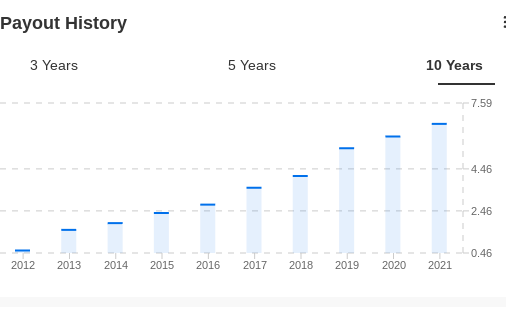Oracle stock surges on potential $20B Meta AI cloud deal
- Companies that increase payouts regularly demonstrate that they can produce steady and reliable income for their investors
- Home Depot is positioned to continue sending dividend checks to retirees
- Apple is one of the most cash-rich companies in the world, with a lot of room for further payout hikes
The past three years have been rather difficult for income-focused investors looking to earn stable, reliable gains in the stock market. First was a pandemic-triggered market crash, then the highest inflation in four decades that pushed markets into bear territory, and now the word recession terrifies everyone.
But despite the numerous macroeconomic pressures, there are still reasonable ways to add stability to your portfolio. One proven way to secure growing income is to buy quality dividend-growth stocks.
Companies that historically increase their quarterly cash payouts demonstrate that they can produce steady and reliable income for their investors during good times, downturns, and recessions.
Such stocks also offer an excellent means for beating inflation. Unlike bonds that pay fixed principal and interest payments, these companies provide a regular pay raise in the shape of dividends to boost your spending power. You can use that cash to reinvest and buy more shares or to meet your monthly expenses.
Below, we have compiled a list of three low-risk, high-quality names suitable for a long-term retirement portfolio.
1. Home Depot
- 5-Year Average Dividend Growth Per Share: 19.4%
- Dividend Yield: 2.44%
- Payout Ratio: 45%
Home Depot (NYSE:HD) is in the perfect position to continue sending dividend checks to retirees. The home-improvement retailer, in recent years, invested heavily to prepare itself for the e-commerce onslaught and changing consumer behavior.
The stock currently offers a good entry point after losing 25% of its value this year.
Before the deadly pandemic hit, the Atlanta-based chain had completed an $11-billion restructuring plan to modernize its stores, upgrade digital options, and enhance offerings for its key trade customers.
Armed with these upgrades, Home Depot should remain in a growth cycle, especially when factors such as a hot real estate market and the changing ways people use their homes are fueling home-furnishing and improvement products.
The company is also a reliable dividend payer. Over the past five years, its quarterly dividend, on average, has expanded 19% per year. With an annual dividend yield of 2.44%, the company pays $1.9 quarterly per share.

Source: InvestingPro
2. Apple
- 5-Year Average Dividend Growth: 10%
- Dividend Yield: 0.54%
- Payout Ratio: 14.7%
Apple Inc (NASDAQ:AAPL) is another large-cap stock that pays regular dividends with a very stable outlook. The iPhone maker’s cash and cash equivalents stockpile currently sits at nearly $180 billion, with only $14 billion in dividend expenses for each of the last three years.
Apple stock is just 4% lower for the year, while the tech-heavy NASDAQ 100 declined more than 15% during the same period.
With a payout ratio of just 14%, the Cupertino, California-based Apple has much room to continue providing income in both good and bad times through a powerful combination of increasing dividends and share buybacks. Over the past five years, Apple hiked its dividend by almost 10% yearly.
Moreover, in recent years Apple has been the biggest re-purchaser of its shares among companies listed on the S&P 500. The smartphone, personal computer, and wearables maker spent $85.5 billion to repurchase shares and $14.5 billion on dividends in its fiscal 2021, which ended in September.
This strength, along with solid earnings, is one of the main reasons Apple shares have remained less volatile in the current selloff of high-growth names.
3. Visa
- 5-Year Average Dividend Growth: 19%
- Dividend Yield: 0.7%
- Payout Ratio: 21%
The global payment giant Visa (NYSE:V) is another solid pick for retirees who want to invest in less risky companies with a reliable dividend history. Visa has raised its annual payout for 13 straight years and has a lot of cash to continue making hikes comfortably.
Just in the past five years, Visa’s dividend per share growth, on average, has been close to 20% each year. During that period, the stock returned 112%, more than double what S&P 500 delivered. 
As the travel economy recovers from the pandemic-related shock, Visa is in a great position to benefit from its massive economic moat. Visa is the largest payment processing network in the world. It has more than 100 million merchants worldwide, with more than $13 trillion in transactions going through its system in 2021.
Disclosure: The writer owns shares of Apple and Home Depot
